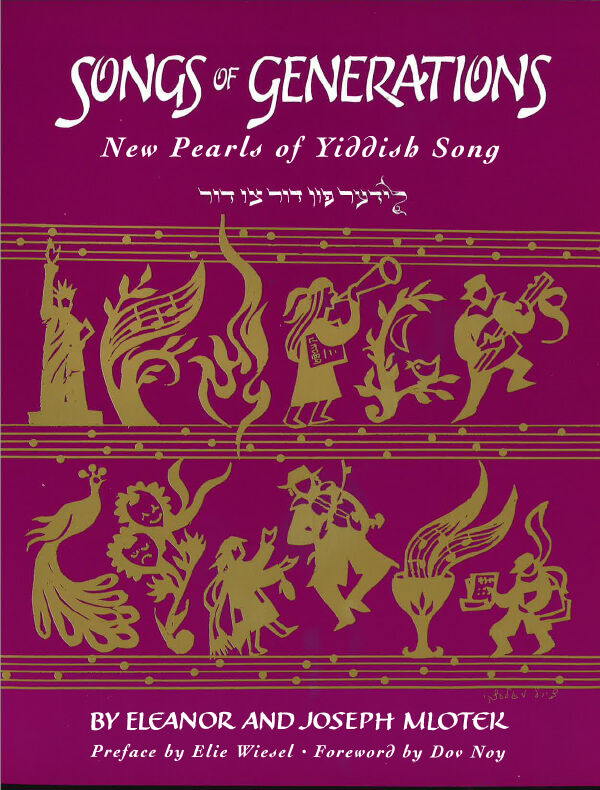Published in Shmerke Kaczerginski’s collection Lider fun di getos un lagern. The song was sung in the ghetto of Oszmiana (a town near Vilno). The words were sung to a popular Polish melody. According to Aleksander Kulisiewicz in Polskie Piesni Obozowe 1939-1945, 1975 (unpublished), one song with this melody was the Polish ghetto song Elzunia (There once was a little girl Elzunia. She is dying alone, for her father was in Maidanek and her mother in Auschwitz). The words, written by a nine-year old girl, were found sewn in her shirt. Below the text was written with crooked letters: “I sang it to the tune of the lullaby. ‘Na Wojtusia z popielnika iskiereczka mruga (From the oven little sparks blink). I am grateful to Dr. Bret Werb of the U.S. Holocaust Memorial Museum for this information. The melody was also used for two other Yiddish songs: one of the many melodies of Sholem Aleichem’s famous lullaby Shlof, mayn kind (Sleep, My Child) and Dos kranke yingl (The Sick Boy), both published in Bine Shteinberg’s Undzer gezang.

Listen to the wind roar, my child. Close your eyes. They’ve taken your father away, I have no idea where.
Only I remain with you, woe is me. There were seven of us, now there’s only you and me.
I’ve pawned your things, my heart aches. Who will make new clothes for you now? The night is long and dark.
There’s no soup in the house, not a bit; there’s not a piece of bread. Your shoes are all torn. Sleep, my child, in poverty.
Listen to me, my child, we must not cry. The guard walks around and will shoot us if he thinks someone is here.
Her, mayn kind, vi vintn brumen,
Makh di oygn tsu,
Dayn tatn hot men tsugenumen,
Kh’veys aleyn nit vu.
lkh aleyn mit dir geblibn,
Vey un vind iz mir,
Geven zaynen mir nefashes zibn —
ltst nor ikh mit dir.
Oysgebitn dayne zakhn,
S’tut mir vey dos harts,
Ver vet dir itst naye makhn,
Di nakht iz lang un shvarts.
Nito in shtub keyn zup, keyn bisl,
Nito keyn shtikl broyt,
Dayne shikh zaynen tserisn,
Shlof, mayn kind, in noyt.
Her, mayn kind, men tor nit veynen,
Der postn geyt do um,
Shisn ken er, ven er t’meynen,
Az men geyt arum.
הער מײַן קינד, זױ װינטן ברומען,
מאַך די אױגן צו,
דײַן טאַטן האָט מען צוגענומען,
כ׳װײס אַלײן ניט װוּ.
איך אַלײן מיט דיר געבליבן,
װײ און װינד איז מיר,
געװען זײַנען מיר נפֿשות זיבן —
איצט נאָר איך מיט דיר.
אױסגעביטן דײַנע זאַכן,
ס׳טוט מיר װײ דאָס האַרץ,
װער װעט דיר איצט נײַע מאַכן,
די נאַכט איז לאַנג און שװאַרץ.
ניטאָ אין שטוב קײן זופּ, קײן ביסל,
ניטאָ קײן שטיקל ברױט,
דײַנע שיך זײַנען צעריסן,
שלאָף, מײַן קינד, אין נױט.
הער, מײַן קינד, מען טאָר ניט װײנען,
דער פּאָסטן גײט דאָ אום,
שיסן קען ער, װען ער ט׳מײנען,
אַז מען גײט אַרום.
Song Title: Her, Mayn Kind, Vi Vintn Brumen

The Songs of Generations: New Pearls of Yiddish Song anthology comprises songs that were either never printed before or appeared in rare and inaccessible publications — sometimes in different versions and without proper sources. Most of the songs in this book were submitted by readers of Chana and Yosl’s column “Perl fun der yidisher poezye” (Pearls of Yiddish Poetry) in the Yiddish newspaper Der Forverts (The Forward), initiated in October, 1970. Over 25 years, thousands of songs were collected in correspondence and on cassettes from readers throughout the world, and they represent a veritable national Yiddish song archive. Chana Mlotek, in her introduction, writes, “In the course of years the inquiries, contributions and enthusiasm of these readers have kept our own interest unflagging and have reinforced our dedication to this effort. And in recent years our participants have also been augmented by new readers from the former Soviet Russia, who receive our newspaper there or from newly-arrived immigrants in this country and Israel.”